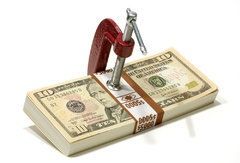The American consumer has called it quits. With a stunning $14 trillion loss of net worth (your net worth is how much you own versus how much you owe) over the past 18 months (and a $1.4 trillion loss in the first quarter of 2009 alone), no one is spending money anywhere, according to Andrew McLaughlin, chief economist of the Royal Bank of Scotland.
Instead, it looks like everyone’s finances have been wrung out to dry.
According to McLaughlin’s “Chief Economists Weekly Brief,” the $1.4 trillion first quarter 2009 loss is equal to an average loss of $13,200 for every US household. Asset values peaked in late 2007, when the stock markets around the world hit a high.
The biggest hit to our net worth has come from falling stock prices and declining home values. Stocks and our homes account for 30 percent (stocks) and 13 percent home values) of household assets, said the Royal Bank of Scotland’s McLaughlin. It wasn’t too long ago that our home value represented the largest portion of our individual net worth. Today, a third of all homeowners find that the value of their homes are worth less than their mortgage balance.
If you’re hoping your net worth will turn upwards as the housing market recovers, you might be waiting for awhile. According to the 2009 State of the Nation’s Housing Report, the worst housing downturn in generations continues to grind on.
According to the study, published by the Harvard Center for Joint Housing Studies, “Despite some stabilization in homebuilding and home sales in the spring, real home prices continued to fall and foreclosures mount in most areas in the first quarter of the 2009. With mortgage interest rates heading higher in June and the economy still contracting, a sustained recovery for housing still faces an uphill climb.”
The study found that the housing industry has suffered under tighter mortgage underwriting guidelines, crushing job losses, and house price deflation: “First-time homebuyers are struggling to meet today’s stricter underwriting guidelines, household growth is well below long-term trends, and immigration has slowed; as a result, the share of homes for sale and vacancies stand at near record levels despite sharp decreases in housing production.”
“The best that can be said of the market is that house price corrections and steep cuts in housing production are creating the conditions that will lead to an eventual recovery,” notes Eric S. Belsky, Executive Director of the Joint Center. “For now, markets remain under considerable stress.”
“Although there are some signs of improvement or at least steadiness in new construction and sales,” says Nicolas P. Retsinas, Director of the Joint Center, “housing starts stand near 60+ year lows and any life in home sales is coming from distressed foreclosure sales, temporary first-time buyer tax credits, and low interest rates that moved higher in recent weeks.”
Indeed. According to the Economics and Statistics Administration, while building permits in May 2009 increased 4.0 percent from the prior month, they decreased 47 percent from a year earlier, to 518,000. Housing starts in May 2009 rose 17.2 percent from April 2009 but fell 45.2 percent from May 2008, to 532,000.
Americans have looked at their decidedly smaller 401(k) accounts and shrinking net worth and decided to stop spending and start saving. The savings rate has galloped past 5 percent, a remarkable turnaround given that some 18 months ago, Americans were actually spending more than they earned, thanks to tapping into their home equity loan or lines of credit. But with home equity loans and lines of credit clamped down or closed out, Americans have been building up their savings by simply not spending whatever cash they have.
Retail stores and small businesses have felt the pinch. But since American consumers account for two-thirds of the spending in the general economy, the economy won’t recover as fast if Americans aren’t spending as much. But maybe, just maybe, that’s a better and more sustainable economic model.
Economists are expecting the US to come out of the recession later in 2009 or early 2010, but don’t forsee a healthy housing market in the near term. That means your net worth isn’t going to recover that fast, unless you start saving even more money.







Leave A Comment